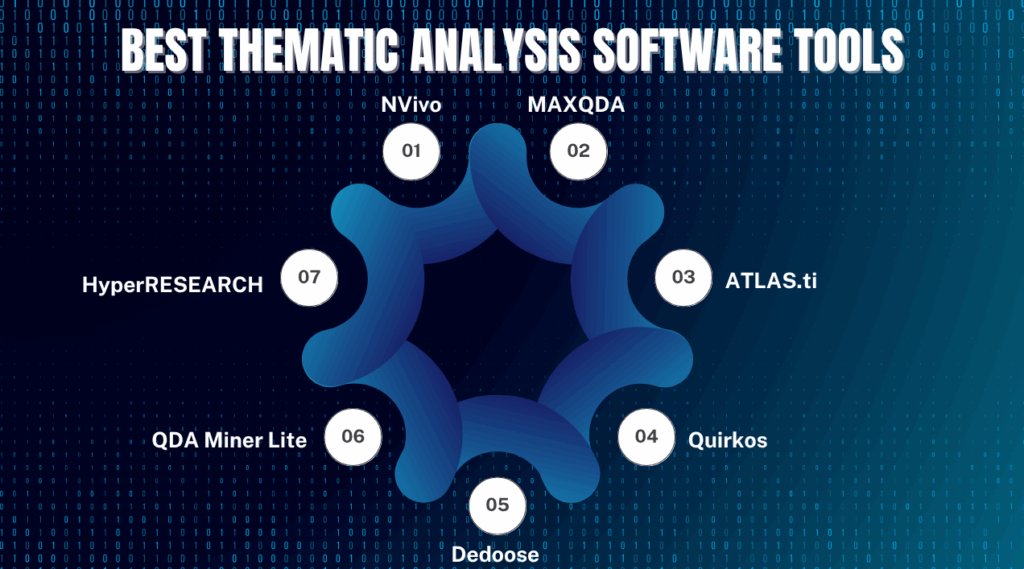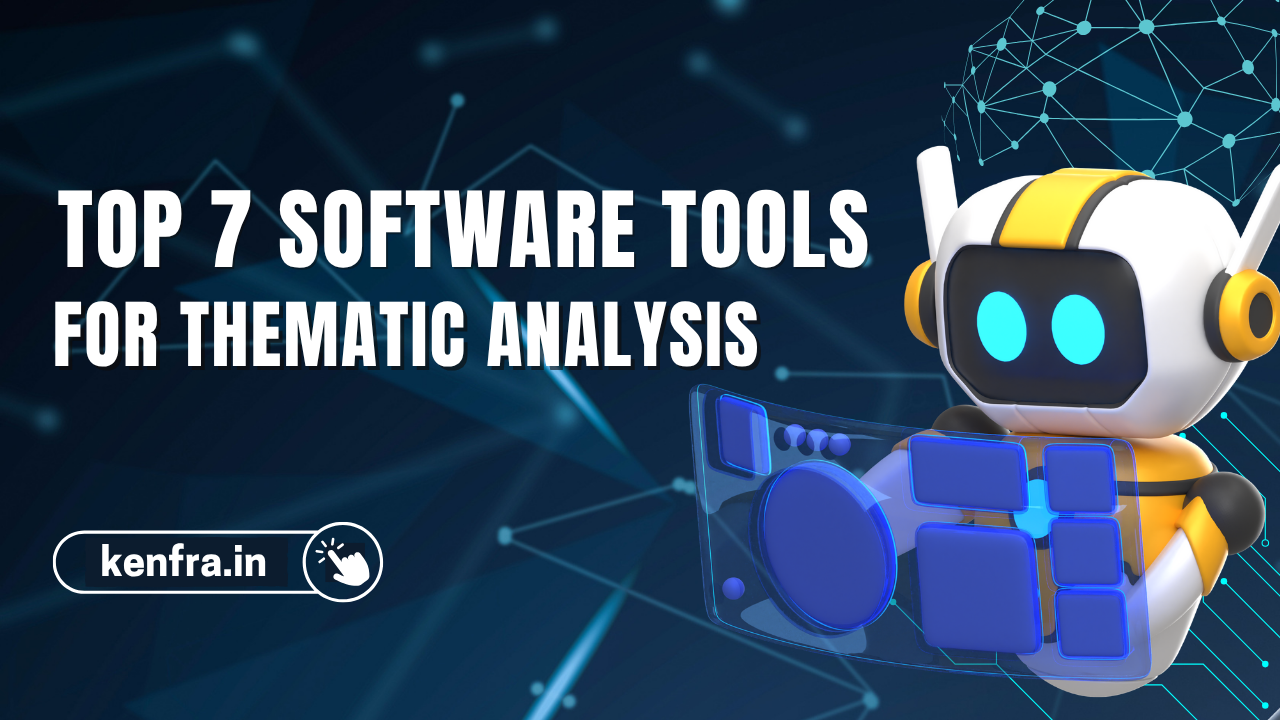Top 7 Thematic Analysis Software Tools for Social Science Research
Kenfra Research - Bavithra2025-07-31T10:26:44+05:30In today’s digital age, conducting qualitative research is no longer limited to manual coding and colored sticky notes. Researchers now have access to a wide range of thematic analysis software tools that streamline the process of identifying patterns, coding data, and drawing meaningful conclusions. Whether you’re a student, academic, or independent researcher, these tools offer efficient solutions for organizing and analyzing complex data.
If you’re looking for thematic analysis software tools that are reliable, user-friendly, and suited for social science research, this guide highlights the top 7 options. Each tool listed here is widely recognized in the research community and serves different levels of expertise, from beginner to advanced.
Explore the Best Thematic Analysis Software Tools

1. NVivo – The Industry Standard for Thematic Analysis
When it comes to qualitative analysis, NVivo is one of the most popular choices. Designed specifically for qualitative research methods, it allows researchers to code text, audio, video, and social media data with ease.
- Key Features: Powerful data visualization, auto-coding, team collaboration.
- Best For: Academics, PhD students, and research professionals.
- Use Case: Ideal for analyzing qualitative interviews and literature reviews.
2. MAXQDA – Versatile and Visual
Another powerhouse in qualitative data software tools for researchers is MAXQDA. It supports a wide range of file types, including PDF, Excel, and images, making it great for mixed-methods research.
- Key Features: Visual coding, memo linking, integration with reference managers.
- Best For: Researchers conducting data analysis in humanities and social sciences.
- NVivo vs MAXQDA vs ATLAS.ti: MAXQDA stands out for its intuitive interface and visual outputs.
MAXQDA is also an excellent option for those searching for user-friendly software for thematic coding and top tools for qualitative coding and visualization.
3. ATLAS.ti – Powerful Yet Accessible
ATLAS.ti is known for its robust features and clean interface. It supports both qualitative and mixed methods research tools, offering flexibility for different research designs.
- Key Features: Network diagrams, word clouds, team collaboration.
- Best For: Multi-user projects and institutional research.
- Software to Identify Patterns in Research Data: ATLAS.ti’s visualization tools help users quickly detect themes and trends.
Its cloud-based version also makes it a top choice among those needing digital tools for research scholars.
4. Quirkos – Simple and Student-Friendly
Quirkos is a great entry-level tool, especially for students looking for easy tools for thematic analysis. Its bubble interface is simple yet effective for visual thinkers.
- Key Features: Drag-and-drop coding, real-time theme visualization.
- Best For: Undergraduate and master’s students, early-stage researchers.
- Tools for Coding Qualitative Data in Research: Quirkos is built specifically for qualitative text analysis.
This is one of the most accessible coding tools for researchers new to the process.
5. Dedoose – Affordable and Web-Based
If you’re on a budget and prefer cloud-based solutions, Dedoose is worth considering. It is widely used in academic research tools for team-based projects.
- Key Features: Cross-tab analysis, multimedia support, secure data hosting.
- Best For: Collaborative research and social science research involving diverse data.
- Free Software for Social Science Research Analysis: While not fully free, Dedoose offers affordable plans ideal for student researchers.
6. QDA Miner Lite – A Free Yet Capable Option
For those seeking a free software for social science research analysis, QDA Miner Lite is a solid choice. Developed by Provalis Research, it offers many basic features of premium tools at zero cost.
- Key Features: Manual coding, basic text analysis, export options.
- Best For: Students, independent researchers, and small projects.
- Best Qualitative Data Analysis Software 2025 (Free Edition): A great starter for learning qualitative analysis without financial investment.
QDA Miner Lite makes thematic analysis accessible to those with limited resources.
7. HyperRESEARCH – All-Rounder with Cross-Platform Support
HyperRESEARCH combines functionality with simplicity and is available for Windows, Mac, and Linux. It’s widely respected in both academic research tools and professional consulting.
- Key Features: Hypothesis testing, multimedia coding, flexible codebook.
- Best For: Researchers who require platform flexibility and intermediate-level features.
- Thematic Analysis Software Comparison: HyperRESEARCH balances power and ease of use.
Its strength lies in offering coding tools for grounded theory and thematic analysis in a single application.

How to Choose the Right Thematic Analysis Software Tools?
Selecting the right tool depends on your research goals, data complexity, budget, and technical skills. Ask yourself:
- Do I need support for multimedia files?
- Is team collaboration important?
- What level of technical support or training is available?
- Do I need free, open-source, or premium software?
Whether you’re doing qualitative analysis for a thesis or working on a collaborative grant project, these thematic analysis software tools can significantly reduce the manual burden while improving accuracy.
Final Thoughts:
From NVivo to HyperRESEARCH, the top qualitative analysis tools for researchers provide features tailored for data analysis in humanities and social sciences. Whether you’re a beginner seeking easy tools for thematic analysis for students or an experienced scholar comparing NVivo vs MAXQDA vs ATLAS.ti, the right tool will empower your research process.
At Kenfra Research, we guide scholars and institutions in choosing the right tools and methods for efficient, defensible, and insightful research. Today, thematic analysis software tools are not just helpful—they’re essential for delivering rigorous results in social science research. Choose wisely, and let your data speak volumes.








Leave a Reply